MEMBER GUEST BLOG Aligning Food Waste Recycling Policy with Biomethane Ambitions: A National AD Operator’s…
MEMBER PRESS RELEASE – Efficiency crucial for the water sector
MEMBER PRESS RELEASE – Efficiency crucial for the water sector

By Matt Hale, Global Key Account Director, HRS Heat Exchangers
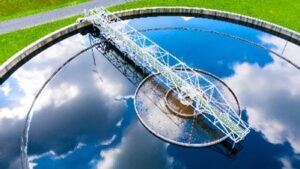
It’s a difficult time for the water sector. On top of global issues – such as the impacts of climate change on the availability of clean water, increasing environmental protections, rising energy prices, and challenges around ageing infrastructure, pollution, forever chemicals and microplastics – many companies also have to face additional local or regional challenges.
These local issues can take many forms, from the UK’s recently published review by the Independent Water Commission, to the European Commission’s European Water Resilience Strategy calling for a 10 percent reduction in water use by member states by 2030. In the United States, Safe Drinking Water Act (SDWA) regulations direct public utilities to install perfluoroalkyl and polyfluoroalkyl substance (PFAS) treatment upgrades to their systems by 2029.
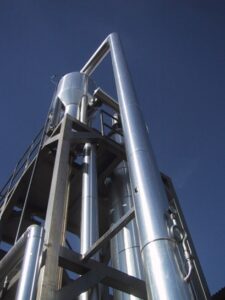
However, these different demands all provide additional impetus to maximise energy and resource efficiency at every opportunity. Sources suggest that water and wastewater systems account for four percent of global electricity consumption (mostly for pumping), and with average electricity prices having risen by up to a third since 2021, that has huge financial, environmental and climate impacts.
It is easy to look at regional or national communications around water and to think that many of the issues and challenges are unique to your local situation, but as a global company, HRS Heat Exchangers sees that while there are differences in the organisation and legislation of water supply and treatment around the world, many of the operators in this sector, whether public or private, face the same strategic issues.
Globally the water industry has made huge strides in improving efficiency, and continues to do so, but it is important to include all aspects of operation and not just focus on the more obvious areas such as pumps or leaks.
The role of efficient heat exchangers
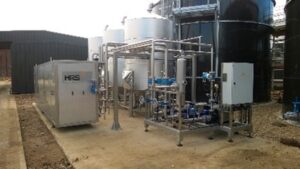
One of the easiest ways to improve the efficiency of thermal processes such as evaporation is by recapturing heat. Heat exchangers represent the best way of doing this as they can have less than half the heat requirement of other systems, such as tanks with heating jackets. Furthermore, a well-designed heat exchanger system could recover and reuse 40 percent of the heat produced by a wastewater AD plant for example.
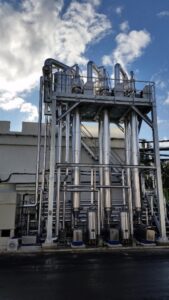
HRS Heat Exchangers provides heat exchangers, evaporators, pasteurisers and other systems for wastewater treatment and anaerobic digestion (AD) facilities around the world. These include corrugated tube heat exchangers specifically designed for high fouling sludges, such as the HRS DTI Series of Double Tube Heat Exchangers, and unique scraped surface designs including the Unicus Series which uses a reciprocal action to minimise potential fouling and create turbulence within the material. Both of these actions help to increase heat transfer rates and together they create a highly efficient heat transfer process ideal for high fouling viscous materials like sludges.
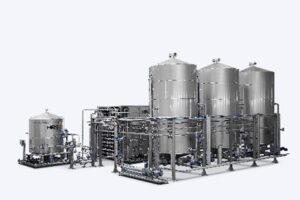
In addition, the HRS Digestate Concentration System (DCS) and HRS Digestate Pasteurisation System (DPS) have been developed as complete solutions for maximising the value of digestate and sludges. The DCS reduces the volume of digestate and sludge by removing up to 80 percent of the water, while increasing its value – in most situations using surplus heat from a CHP engine or biogas boiler – combined with efficient multi-effect evaporation technology. The DPS pasteurises digestates and sludges pre- or post-digestion, maximising overall process efficiency while meeting global regulatory standards (such as PAS110 and Animal By-Product regulations in the UK).
For more information on the complete HRS range of heat exchangers and systems for water and wastewater treatment, please contact us.
-ENDS-
About HRS Heat Exchangers
Located in the UK, HRS Heat Exchangers is part of the EIL Group (Exchanger Industries Limited) which operates at the forefront of thermal technology. HRS offers innovative heat transfer solutions worldwide across a diverse range of industries. With more than 40 years’ experience in the water treatment and environmental sectors, specialising in the design and manufacture of an extensive range of turnkey systems and components, incorporating our corrugated tubular and scraped surface heat exchanger technology, HRS products are compliant with global design and industry standards. HRS has a network of offices throughout the world: Australia, Canada, New Zealand, UK, Spain, USA, Malaysia and India; with manufacturing plants in India, Spain and Canada.
Email for publication: info@uk.hrs-he.com
www.hrs-heatexchangers.com
For UK media enquiries about HRS Heat Exchangers please contact:
FastLoop Media
marketing@hrs-he.com
Bev Small, FastLoop Media
T +44 (0) 7901 841491 E bev@fastloopmedia.com
Kate O’Reilly, FastLoop Media
T +44 (0)7894 039 609 E kate@fastloopmedia.com
W www.fastloopmedia.com
